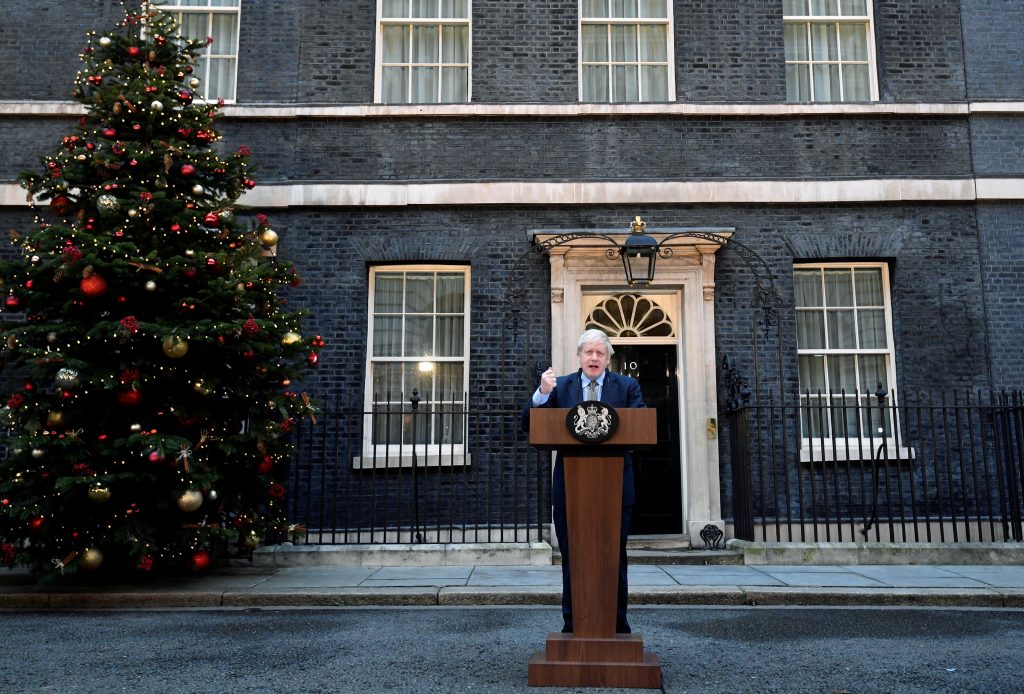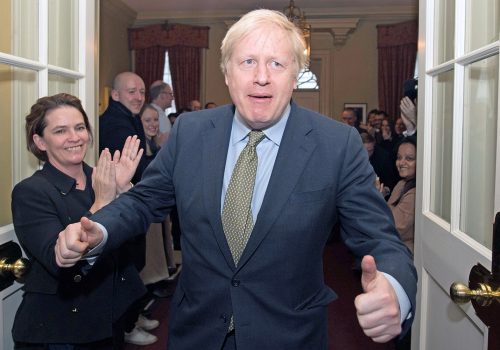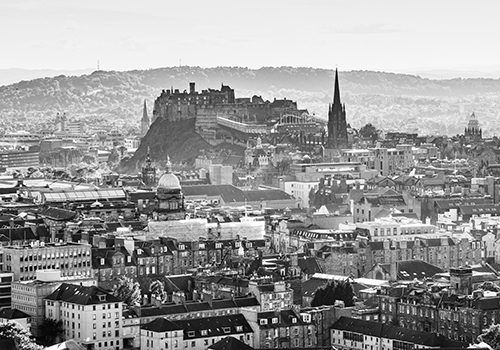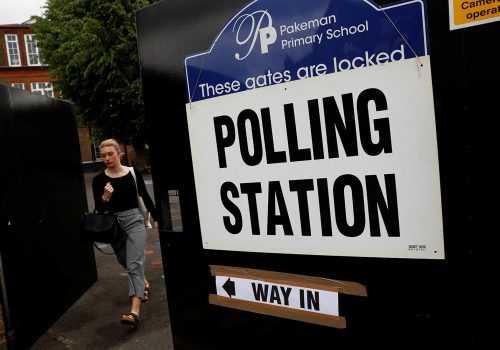It is just the sort of script one might expect from Boris Johnson, one of the most enigmatically fascinating personalities of our times.
Prime Minister Johnson – who famously craves both public attention and a place in history – won the former and a shot at the latter through a British election victory this week that was the most convincing conservative victory since Margaret Thatcher in 1987. To save the United Kingdom itself, however, he must reverse course, or at least amend direction, on much of what he has said and done to win in the first place.
I opposed Brexit on economic and political grounds yet, at the same time, Johnson might have the political flexibility, the intellectual chops and the Churchillian ambition to confound his critics along the five lines of action he must simultaneously pursue to find his historic place.
- Most importantly, he’ll have to negotiate a “no-tariffs, no-quotas” trade deal by end-2020 with a European Union that he has disparaged, knowing that it by some distance is the UK’s major trade partner.
- Second, he will have to rapidly restore external economic confidence in a country that has been suffering disinvestment, an economic slowdown, and doubts about its continued role as a European and global financial hub.
- Third, he should still aspire to get a trade and investment deal with an impeachment-distracted President Trump. At the same time, he should share with voters how unlikely that will be and embrace what might be faster and easier opportunities in Asia, namely negotiating his way into the 11-country Comprehensive and Progressive Agreement for Trans-Pacific Partnership (CPTPP).
- Fourth, he’ll have to abandon much of the populist rhetoric that got him elected and embrace his encouraging “One Nation” message of this week that could heal the country’s divisions – and perhaps also slow a European-wide and global populist trend.
- Finally, he’ll need save the United Kingdom from unravelling by convincing Scotland and Northern Ireland of their future place – while heading off another Scottish independence referendum. A successful EU negotiation will help that.
Media pundits in recent months have compared and associated the rise of Boris Johnson and Donald Trump as populists who have turned their countries’ politics upside down. Yet the comparisons only go so far, given Boris’ bookish, multilingual, multicultural background, and intellectual passion.
Get the Inflection Points newsletter
Subscribe to Frederick Kempe’s weekly Inflection Points column, which focuses on the global challenges facing the United States and how to best address them.
He was born in Manhattan as Alexander, then raised in Brussels until age 11, before being shipped to a British boarding school a year after his mother’s breakdown, a life richly chronicled by Tom McTague in The Atlantic last July. Somewhere along the way the quiet child became the boisterous, eccentric British Boris. He developed a comic demeanor, a disheveled mean (and mane), a rapier intellect with a taste for the classics, and an insatiable desire to be liked.
From all of this grew his self-proclaimed ambition to be “world king.”
“I often thought that the idea of being world king,” said his mother of her illness’ impact on Boris, “was a wish to make him unhurtable, invincible somehow, safe from the pains of life, the pains of your mother disappearing for eight months, the pains of your parents splitting up.” The biographer Sonia Purnell says Johnson told girlfriends that his way of coping was to make himself invulnerable “so that he would never experience such pain again.”
The Brexit referendum and— three years later— his election vote are part psychological and part political drama for Boris Johnson, the stuff of a West End musical. His Friday speech on the steps of 10 Downing Street showed how quickly he can change his tune from that of the campaign to one of governance.
Speaking to those voters who opposed him and wished to remain in the EU, he said, “I want you to know that we in this One Nation Conservative government will never ignore your good and positive feelings – of warmth and sympathy toward the other nations of Europe.”
He went further.
“As we work together with the EU as friends and sovereign equals in tackling climate change and terrorism, in building academic and scientific cooperation, redoubling our trading relationship…” he said, “I urge everyone to find closure and let the healing begin.”
That will be easier said than done as Johnson will now have to decide what kind of UK he wishes to build – one more akin to its neighbors in the EU or one more resembling a low-tax, deregulated Singapore-on-Thames.
“Brexit will formally happen next month, to much fanfare,” writes the Economist, “but the hardest arguments, about whether to forgo market access for the ability to deregulate, have not begun. Mr. Johnson will either have to face down his own Brexit ultras or hammer the economy with a minimal EU deal.”
French President Emmanuel Macron, enamored by his colleague’s intellect and linguistic skill, has called Boris Johnson “a leader with genuine strategic vision” who should be taken seriously. This week he extended an olive branch while in Brussels, telling “British friends and allies something very simple: by this general election, you confirmed the choice made more than three years ago, but you are not leaving Europe.”
On the other hand, he has warned, the best way to reach the most ambitious trade agreement with the EU would be if the UK essentialy says “we don’t want to change very much.”
So, the drama will continue. If the UK’s economy emerges as robust and healthy, other European countries might wonder about the value of staying in. If Johnson defines his country as too close to the European Union, irrespective of economic logic, his base may well ask what the past three years’ drama has achieved other than serving Johnson’s own political ambitions.
It’s time to raise the curtain on the next act.
This article originally appeared on CNBC.com.
Frederick Kempe is president and chief executive officer of the Atlantic Council. You can follow him on Twitter @FredKempe.
Must-Reads From a World In Transition
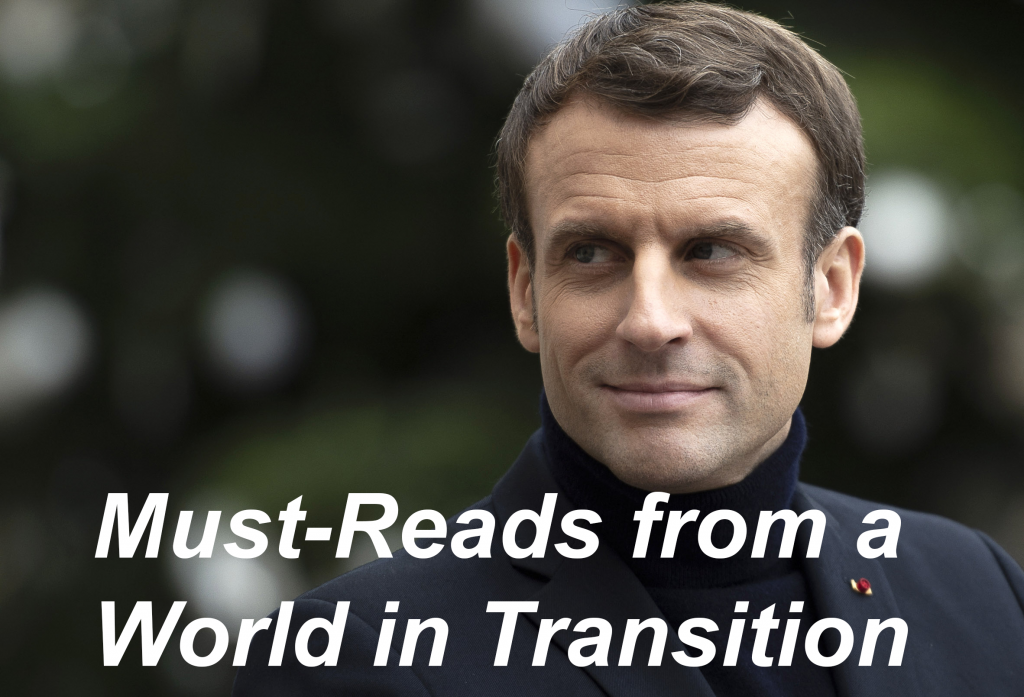
#1. A BRITISH REVOLUTION?
It’s Boris Johnson’s Britain Now
Tom McTague/The Atlantic
The Atlantic’s Tom McTague provided the best profile I’d read on Boris Johnson in July, and I reproduce it here again. This week he turned around a smart, quick analysis – complete with reporting from the front – on how the Britain that emerged this week “is different from the one that came before, its old political map erased, its economic model upended, its prospects uncertain – even its unity in doubt.”
He weaves a rich narrative of “a remarkable story of political change brought about by voters and politicians – and one politician in particular… And yet, while this is a story with one central character, it is also about the deep structural and demographic currents working under the surface…” Read More →
#2. UNDERSTANDING MACRON
Emmanuel Macron’s New Strategy is Disruption
Benjamin Haddad / Foreign Policy
The Atlantic Council’s own Benjamin Haddad, after some travels through Europe, weighs in on how the continent should understand that President Macron’s sharp critiques of both the European Union and NATO are a call for change prompted by his view of the historic moment.
“The French president,” he writes, “is convinced Europeans are sleepwalking into strategic irrelevance in a world dominated by the U.S.-China rivalry, where shifting U.S. priorities will move it away from areas critical to Europe’s interests. This is a shift that started before Trump and will likely outlast him.” Read More →
#3. MURDER IN GERMANY
How Russian Agents Hunt Down Kremlin Opponents
Der Spiegel Staff
This one reads like a spy thriller: ”The Case of the Bicyclist Killer.”
Der Spiegel reporters – working with Bellingcat, The Insider and the Dossier Center – connected two murders, one in Moscow in 2013 and one in Berlin this year, likely to the same person. In both cases, the killer rode away after shooting his victim in the head and body, once captured on surveillance footage and the second time reported by witnesses.
The reporters show evidence that links the two killings to likely the same individual using a changed identity card, an individual who this summer in Berlin hit Zelimkhan Khangoshvili of Georgia. “The Chief Federal Prosecutor’s Office,” write the reporters, “is accusing the Russian government or one of its henchmen of having murdered” the Georgian in broad daylight, “a hitjob on German soil against a man who had come to the country as an asylum-seeker.” Read More →
#4. THE AFGHAN PAPERS
The Afghanistan Papers: A secret history of the War
Craig Whitlock/ The Washington Post
The Washington Post is rolling out a high-profile investigative series regarding the war in Afghanistan, based on a treasure trove of 2,000 documents. Expect this one to go to the Pulitzer panel.
The piece says that the documents reveal “that senior U.S. officials failed to tell the truth about the war in Afghanistan throughout the 18-year campaign, making rose pronouncements they knew to be false and hiding unmistakable evidence the war had become unwinnable.”
To get a full picture, also read a Washington Post op-ed by Ryan Crocker, former US ambassador to Kabul. “…For anyone paying close attention, ”there are few surprises here,” writes Crocker, one of our finest diplomats.
He sees the glass as “half full,” based on the many improvements he witnessed in a country that lacked institutions, a body of enforceable laws, army or police when he arrived in early 2003. A country that had but 900,000 Afghan children in schools, all of them boys, had by 2012 some 8 million children, a third of them girls.
“Does that sound like a disaster?” he asks. Read More →
#5. BEETHOVEN’S INSPIRATION
This holiday season we can all learn a lesson from Beethoven
Arthur Brooks / The Washington Post
Inspired by Arthur Brooks’ column, I turned off the usual holiday tunes and cranked up my best recording of Beethoven’s Ninth, this one from Leonard Bernstein and with German chorals.
It was good to be reminded that Beethoven produced his greatest triumph, and what many believe is the best orchestral composition in history, after he had been deaf for years and passed through despair to the other side. When he conducted this piece, a member of the orchestra had to turn him so that he could see the thunderous ovation.
“As his hearing deteriorated,” Brooks explains, “he was less influenced by prevailing compositional fashions, and more by the musical structures forming inside his own head.” Nothing stood in the way of his originality. Read More →
Quote of the Week
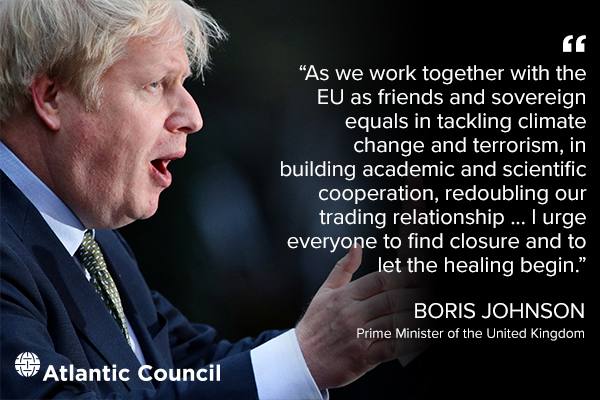
A look back at NATO Engages London
Atlantic Council Top Reads
Image: Britain's Prime Minister Boris Johnson delivers a statement at Downing Street after winning the general election, in London, Britain, December 13, 2019. REUTERS/Toby Melville
